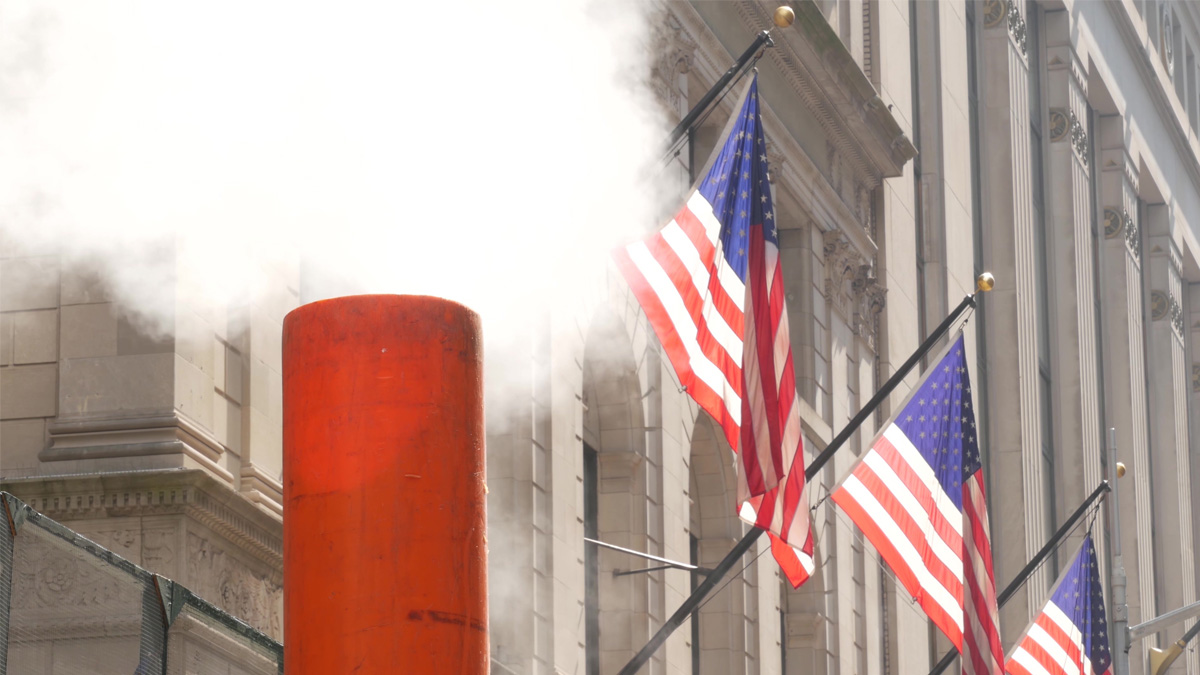Sage’s CEO on learning to lead as an introvert
Steve Hare admits he found the transition from finance boss to CEO hard, but says he has learned to be more aware of the impact he has on people around him
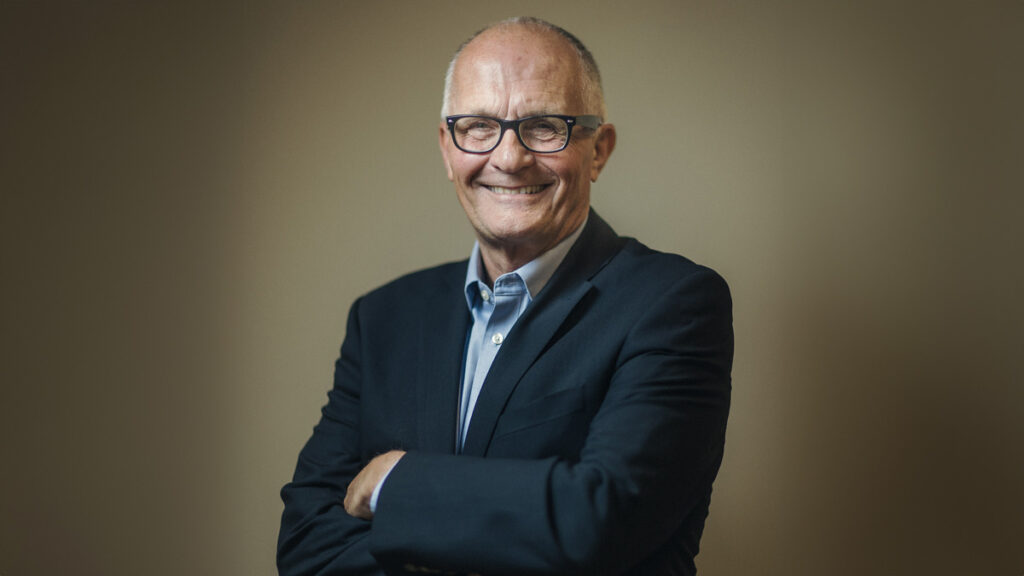 Steve Hare, CEO of Sage
Steve Hare, CEO of Sage
You can listen to our podcast interview with Steve Hare here.
Newcastle-upon-Tyne. Home to Geordies, Newcastle United and one of the UK’s biggest companies. St James’ Park, Newcastle United’s stadium, looms over the city centre like a cathedral. Football here is like a religion.
The home of Sage is far more understated. A 20-minute drive from the city centre takes you to C22 and C23 Cobalt Park. About 2,000 people are doing world-leading work here. This is not Silicon Valley or even Shoreditch in London, but what is being developed here rivals anything from those tech hubs.
Sage was founded in 1981 as a spin-out from Newcastle University. David Goldman, Graham Wylie and Paul Muller used new IT technology to develop computer software that allowed businesses to automate their accounts.
Today, Sage is the biggest listed tech company in the UK, worth £11bn. It is exactly the sort of company the UK needs more of – a promising technology business that has developed into a FTSE 100 giant and is based outside London. Its tech now includes a range of online-based services that allow small and medium-sized businesses to perform administrative tasks faster.
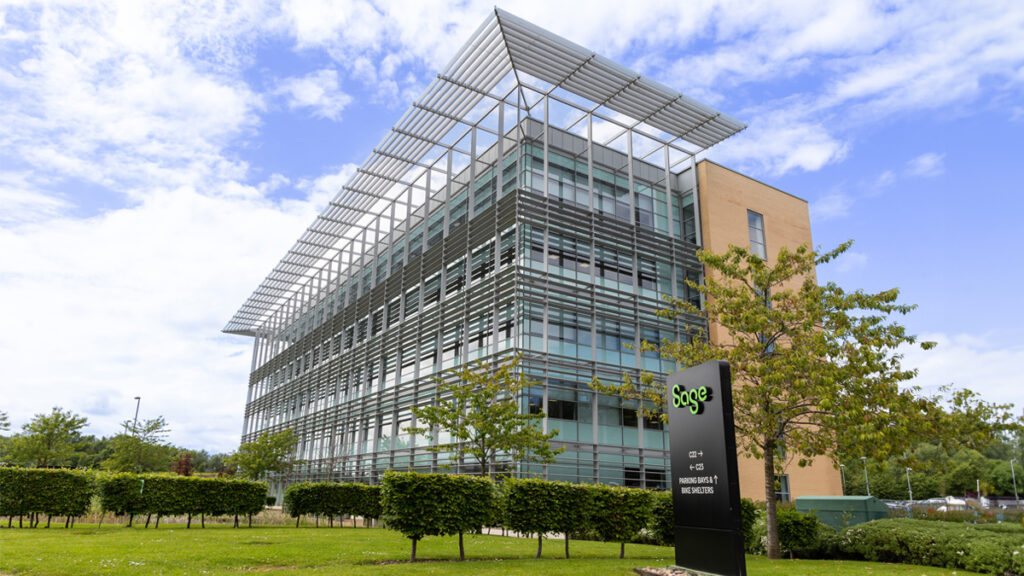
Steve Hare has been chief executive since 2018 after initially joining as finance director in January 2014. “We’ve built a long history of being here and therefore we are an attractive, well-known company to work for,” Hare says. “We can attract the very best talent in the North East.
“We’ve expanded into Europe, the US and South Africa. Now 45 per cent of our revenue is in the US and only about 20 per cent is in the UK. But this is still our home. This is where our roots are. I think that really matters.”
One of the keys to the company’s success is how it has developed and trained its own staff. Since 2015, Sage has employed more than 600 people through apprenticeship schemes in the UK, mainly in the Newcastle area.
“We work very, very hard to create the right environment so that people choose to come and work for us and want to develop their career here,” Hare says. “Even when they decide to move on and do something else, that alumni is very important. I want people to leave and still be Sage evangelists.”
That hasn’t always been the case. When Hare took over as chief executive there was a downbeat mood among staff. Stephen Kelly had stood down as chief executive in August 2018 warning of “execution issues”. Sage was struggling to shift from being a business that sold licences to use its software to one that offered subscriptions to online services.
A glance at the share price of Sage shows you that Hare has turned it around. It stood at £5.95 on the day that Kelly stood down. In early 2024 it reached record highs of more than £12.
Initially, however, Hare did not want the job of chief executive. Having been finance director for four years, he felt partly responsible for the poor scores that Sage was receiving on workplace review websites such as Glassdoor. “It was a wall of negativity about working at Sage, which I found very painful,” he says. Hare also wasn’t sure whether he knew enough about technology to drive the business forward.
Hare was named interim boss while the board, led by chairman Sir Donald Brydon, hunted for a new chief executive. He spent this time travelling to Sage offices around the world, speaking to staff, meeting customers and listening to what they said about the business. At an all-hands staff meeting in Atlanta, Hare had a rethink about whether to go for the chief executive job.
“I’d come up with this format where I never did any presentations or anything. I just did a Q&A and had someone interview me. I just said: ‘Ask me any questions. I want to know what’s on your mind. If you don’t tell me, I can’t do anything about it.’”
The interviewer in Atlanta asked Hare a straightforward question: “How is the search for a chief executive going?”
“I gave him a slightly political, non-committal answer,” Hare recalls. “He replied: ‘Steve, that’s not like you. That’s not a direct answer to a direct question. Are you in the running?’”
Hare said he wasn’t. “I don’t think I’m the right person,” he told the audience. The interviewer disagreed: “Well, if you changed your mind and decided you wanted to be CEO, a lot of people here in Atlanta would get right behind you.”
The audience of about 200 people all started clapping. Hare was taken aback. “I thought: ‘Hmmm, maybe I’m making some progress here’. In the meantime, I’d also been digging into the technology. I got to a point where I went back to Donald [Brydon] and said: ‘I don’t know where you’ve got up to with the selection process, but if you decide that I’m the right person – and it is important you think that I am the best person – I’d like to give it a crack.’”
That is indeed what the board decided. Hare was named chief executive in November 2018.
The difficult transition to CEO
“I found the first year incredibly hard,” he says. “I hadn’t prepared myself for what it’s like to be truly at the top of the tree, just how many people rely on you. All the different stakeholders – customers, colleagues, shareholders, everything… there are a lot of moving parts. When I first became CEO, I didn’t really have a system or take control of how I spent my time.”
Hare started to make progress after receiving advice from another chief executive and former finance director, who began mentoring him. “You’ve just got to be really tough,” the mentor told Hare. “You must only do what only you can do. If you’re doing things other people can do, you should let them do it.
“The CEO should only do certain things and you need to really focus on those. It tends to be people and culture. The culture starts with the person at the top of the tree. You’re a technology company so you’ve got to work closely with the technologists to ensure you’re making the right products.”
The mentor, who Hare does not name, gave him some other advice, too: “When you’re a CFO, you tend to spend a lot of time planning, looking for risk and trying to eliminate that. When you’re a CEO, you have to be prepared to be out of your comfort zone, take calculated risks and push boundaries.
“If you have the right people around you, there will always be the checks and balances taking place anyway. But if you’re conservative as the CEO, you won’t be successful. You have to be bold, you have to push, you have to test and you have to look for areas where you can get some differentiation.”
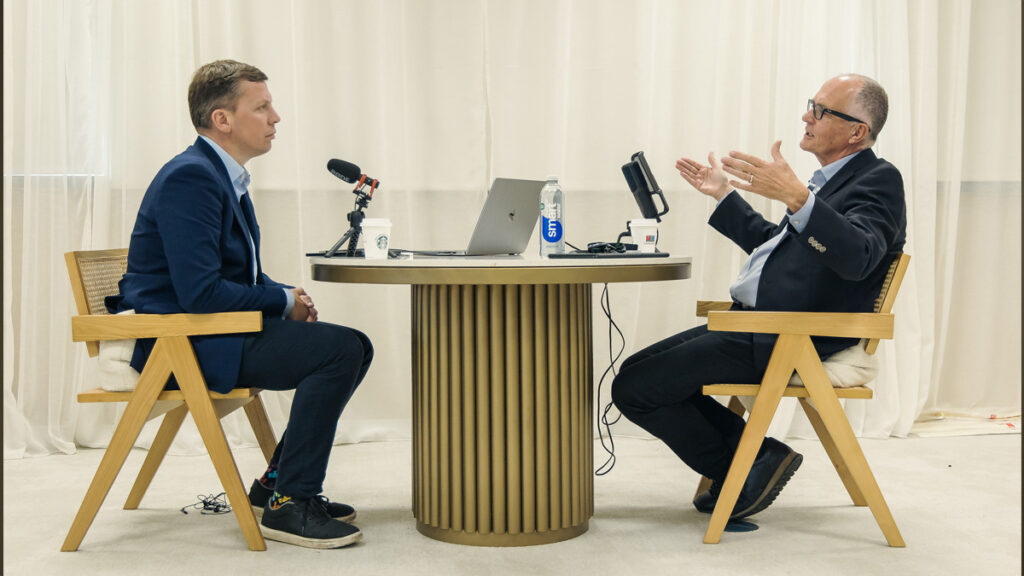
Other parts of the job – such as meeting Sage’s customers – came more naturally to Hare. As a trained accountant himself, Hare had a sense of what these businesses needed from the company and its tech.
“What I love about serving small and mid-sized businesses is the stories of how people came to be where they are,” Hare says. These conversations have also given him a unique insight into the challenges and opportunities for businesses. He says that optimism and resilience are two attributes that really stand out.
“At least 90 per cent of the small business owners I talk to will tell you all the things they tried that didn’t work,” Hare says. “It’s very rare that someone has this incredible idea, acts on it and it’s immediately successful. They have all these stories about the barriers they hit and how they got around them. There is this consistency of resilience and not being prepared to let something get in the way. I think successful small business owners have a way of making things happen.
“Of course, that’s true in the case of most successful people – they’re driven to overcome challenges that present themselves and to get things done. I think this is especially so with small business owners, where they don’t have the luxury of hiring lots of people or an abundance of excess capital. They have to do the best they can with what they have got. That makes them very determined.”
Why medium-sized businesses need a support ecosystem
Hare thinks that medium-sized businesses in the UK are held back by access to capital and the lack of a support system. “We tend to be very good in the UK at having money available to back ideas at the very beginning, but once they need to scale up and require access to more capital that can be a bit harder,” he says.
“The second thing, and I think this is where the US is very good, is that you also need a support ecosystem. If you’re doing something where you can network with other people who are in a similar field or period of the business journey, they can put you in touch with people who can assist you – whether that be mentors or financial assistance. That tends to create a reinforcing effect.
“We’ve done things in the UK to try and promote that – Cambridge as an ecosystem has been a successful model, there’s talk of creating Silicon Roundabout in Shoreditch – but it’s a bit inconsistent,” he says.
“Newcastle is a great place for talent and a great place to start a business but a supportive ecosystem for building that business doesn’t exist. This is why so many people end up going to London, to access the contacts that you need to successfully grow a business. I’d like to see that more balanced across the country.”
Hare was born in Yorkshire but also spent time in Hong Kong as a youngster after the family moved due to his father’s job in engineering. He knew from an early age that he wanted to work in business and trained to be a chartered accountant after university because he thought it could open up possibilities.
It did. Hare joined the engineering group Marconi in 1989, where he quickly gained a reputation for getting things done and being a troubleshooter. He rose through the ranks and 10 days before his 40th birthday became the finance director of the company, then one of the biggest organisations in the UK.
“For me, that was the pinnacle of everything I’d set out to achieve,” he says. But things quickly went wrong. “It all blew up and we had to do two profit warnings. We ended up having to undertake a considerable debt-for-equity swap where the banks and the bondholders took control of Marconi.”
You’ll never work in the City again
Hare led negotiations on the debt-for-equity swap. The deal saved the company, but it cost Hare his job. He was told by the chairman that the price of the deal would be his exit as finance director.
Negotiations with the banks had been tough and they told the chairman that they could no longer work with Hare. “Nobody was very happy because everyone had to take their share of the pain in the debt-for-equity swap,” he says. “So I ended up losing my job. I went from being one of the youngest CFOs to having to re-evaluate what I was going to do next.”
One of the bankers who had worked on the deal told Hare he would never work in the City again. “I am a stubborn Yorkshireman really, that runs quite deep. I really don’t like being told that I can’t do something,” Hare says. “I took a bit of time. I ran my own business for about 18 months doing consulting work and then I thought: ‘Well, you know, I’m not done.’ I worked really hard to get to that point where I was on a public company board. I didn’t want that to be the last gig.”
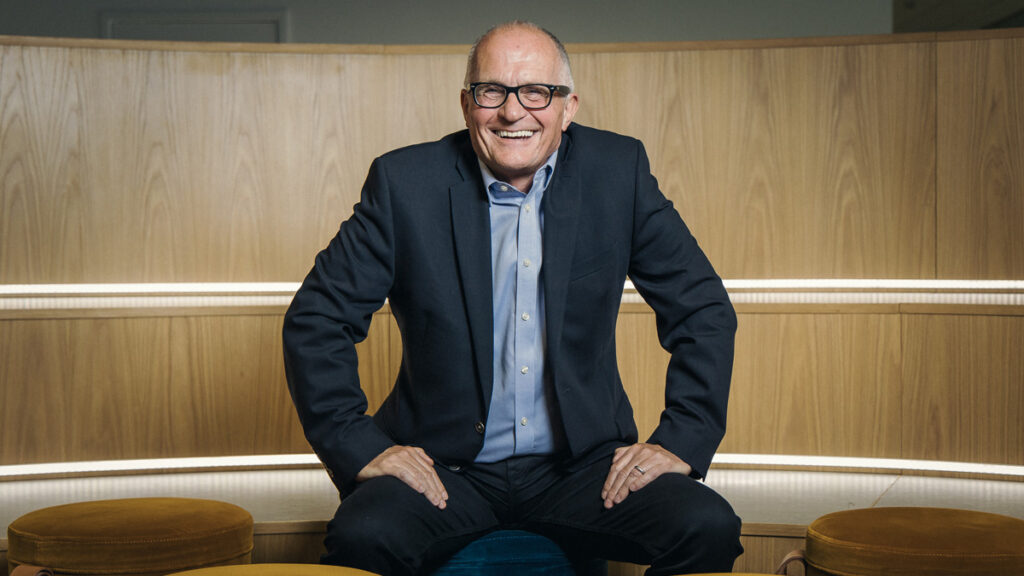
Hare decided to try again. He got a job as finance director at a smaller engineering group, Spectris, and rebuilt his career from there. That set him on the path to joining Sage in 2014.
Hare is now 63 – an older and wiser figure than the finance director he was at Marconi in the early 2000s. “I’ve learnt a lot,” he says. “It’s very important that whatever age you are and whatever experience you’ve got, every day you look to learn. It’s about maintaining that growth-learning mindset.
“When I was younger, I was very much driven by getting things done. That’s what kind of made me famous – going into difficult situations and making stuff happen. But I was less aware of the impact I was having on others. To use the phrase, at times I could be a bit of a bull in a china shop. I wasn’t too worried about some of the collateral damage that occurred along the way. I wasn’t the sort of person who would deliberately do things that adversely impacted others, but I just lacked that awareness and the empathy that’s required to build truly high-performing, sustainable teams. I was driven to short-term outputs.
“I’m naturally an introverted person. While I like people – it’s not like I’m a loner and I don’t like interacting with people – I prefer very small groups really. When I was younger, I wasn’t very good at realising the impact of how I behaved when I came under intense pressure. Introverts tend to go more into themselves when they come under immense pressure, whereas an extrovert goes the other way and will engage with lots of people.
“The way I reacted to pressure was to become a bit withdrawn. I didn’t always take people with me, whereas I think now I’m much better at that and certainly more aware of the impact that I’m having on the people around me.”
Now that Hare has reached the top and Sage is thriving, he is determined to stay there. “One of the most dangerous things about having experience is that you can look at something and say: ‘I’ve seen this before’. The world is changing extremely quickly, particularly in technology. It’s really important to get input from wherever you can find it,” he explains.
“I will often talk to younger colleagues at Sage who were born in the digital age and I want to understand how they see something – how do they decide which applications they use? They’re driven by social media.
“When I had my first job – and this makes me sound really old – there were no mobile phones, no computers and no social media. I have learnt to operate in the digital age and I have learnt to drive what we do at Sage in a digital world.”
Listen to the full interview here:


